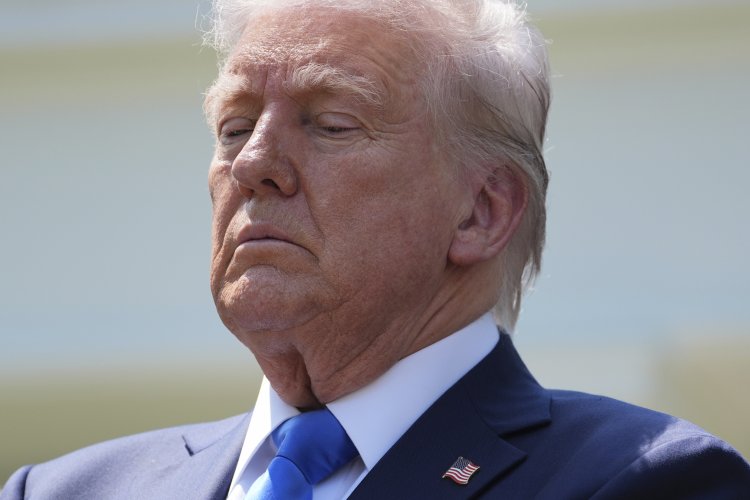Deal on Minerals Between Trump and Ukraine Spurs Confusion Over Handling Russia
White House officials are evaluating their next steps.

Administration officials celebrated the deal on Thursday as a significant achievement; however, insiders from the White House report a lack of consensus on the next steps, as revealed by two individuals familiar with the discussions who requested anonymity because they are not authorized to speak publicly.
Potential strategies may involve difficult decisions, including exerting direct pressure on the Kremlin, a measure Trump has been hesitant to pursue so far.
“More sanctions would be the next turn of the screw,” one source indicated. “If the president wants to go that route.”
A proposal backed by Sen. Lindsey Graham to implement new sanctions on Russia and impose 500 percent tariffs on countries purchasing Russian oil, gas, and aluminum has gained considerable bipartisan backing in the Senate, potentially achieving a veto-proof majority. On Thursday, France’s foreign minister, Jean-Noël Barrot, stated he discussed the “commendable” proposal with Secretary of State Marco Rubio in a meeting, emphasizing the need for European allies to collaborate with the U.S. on these new sanctions.
Whether an additional sanctions regime will be sufficient to pressure Putin remains uncertain.
The Russian leader has met with Trump envoy Steve Witkoff four times in recent months and continues to reject the U.S. proposal for ending the three-year conflict, which aims to freeze hostilities along current battle lines and grant Russia significant territorial acquisitions.
In response to intensified Russian bombing recently, Trump has questioned on social media whether he should adopt a tougher stance toward Putin. Yet, over the past four months, he has not demonstrated much inclination to do so. He has not taken a position on a Republican proposal to ramp up sanctions on Moscow, and his hesitance to authorize further aid for Ukraine’s military efforts or post-war security guarantees has made a forward-looking revenue-sharing agreement necessary.
In the briefing room on Thursday morning, press secretary Karoline Leavitt described the “historic” deal as proof that the president is “the dealmaker in chief” and is dedicated to “securing a lasting peace” in Ukraine. The administration’s emphasis on the Ukraine deal comes just after the president reached the politically notable 100-day milestone of his second term, which passed without him having finalized any trade agreements or brokered peace between Russia and Ukraine as promised at the beginning of his administration.
Treasury Secretary Scott Bessent, who led negotiations for the minerals agreement over recent months, indicated in a television interview that it may influence the stalled peace talks.
“This is a strong signal to the Russian leadership, and it gives President Trump the ability to now negotiate with Russia on even a stronger basis,” he said during an appearance on Fox Business Network.
Referencing Trump’s February 28 scolding of Ukrainian President Volodymyr Zelenskyy in the Oval Office, where Trump told Zelenskyy that he didn’t “have the cards” in peace negotiations, Bessent claimed that this is no longer the case.
“President Trump has now dealt him the royal flush, because now we can take these cards and go and show the Russian leadership that there is no daylight between the Ukrainian people and the American people between our goals,” Bessent remarked.
Another Treasury official, who requested anonymity to discuss the agreement, asserted that increased U.S. economic interests in Ukraine’s future would demonstrate the U.S. commitment to Ukraine’s long-term success.
Richard Haass, former head of the Council on Foreign Relations and a veteran of three Republican administrations, noted that while the deal is a constructive step towards improving U.S.-Ukraine relations, it is not a “game-changer” for peace negotiations.
“We shouldn’t oversell this. It’s not a substitute for an open-ended, longer term U.S. military and intelligence support for Ukraine,” Haass expressed. “The single biggest question is whether this agreement leads to something more between the U.S. and Ukraine.”
Trump has characterized the deal as a means for American taxpayers to recoup some of the $120 billion in U.S. defense aid provided over three years, despite the final agreement not obligating Ukraine to repay any aid.
Instead, the two nations will establish a joint investment fund aimed at rebuilding Ukraine post-war. Under the deal, the U.S. will have preferential rights to mineral extraction in Ukraine, while Kyiv will maintain the final authority on what and where mining occurs and keep ownership of the subsoil. Ukraine will continue to control its natural resources and contribute 50 percent of future revenue from new licenses for critical minerals, oil, and gas exploration.
Moreover, the agreement allows the U.S. to add to the fund via direct payments or through new military assistance, leaving open the possibility of Congress approving a supplementary defense package for Ukraine, although further taxpayer-funded aid seems uncertain.
As Bessent highlighted, the urgency for finalizing the economic cooperation agreement grew in recent days following Trump’s meeting with Zelenskyy on the sidelines of Pope Francis’ funeral last weekend. It also emerged as the president became increasingly frustrated with Putin’s intensifying bombing campaign on Kyiv and rigid stance on peace negotiations, although a White House official noted that Russia's tough public position did not fully reflect the private discussions taking place with Moscow.
“If anything, the Russian stance has toughened,” Haass remarked. “They are prosecuting the war with no letup, and their articulated position is getting more, not less, demanding and farther away from a ceasefire.”
Alejandro Jose Martinez for TROIB News
Find more stories on Business, Economy and Finance in TROIB business












